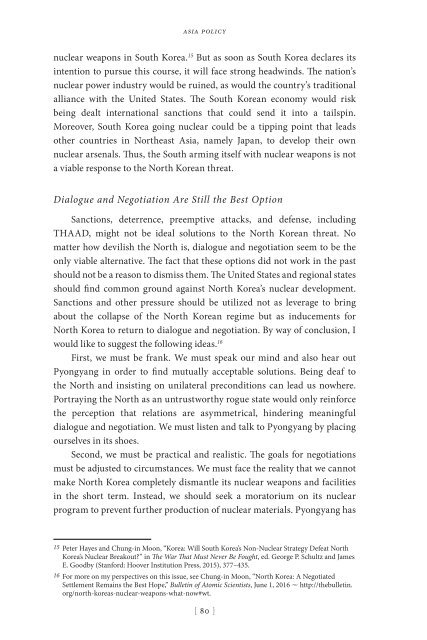2jBVKVf
2jBVKVf
2jBVKVf
You also want an ePaper? Increase the reach of your titles
YUMPU automatically turns print PDFs into web optimized ePapers that Google loves.
asia policy<br />
nuclear weapons in South Korea. 15 But as soon as South Korea declares its<br />
intention to pursue this course, it will face strong headwinds. The nation’s<br />
nuclear power industry would be ruined, as would the country’s traditional<br />
alliance with the United States. The South Korean economy would risk<br />
being dealt international sanctions that could send it into a tailspin.<br />
Moreover, South Korea going nuclear could be a tipping point that leads<br />
other countries in Northeast Asia, namely Japan, to develop their own<br />
nuclear arsenals. Thus, the South arming itself with nuclear weapons is not<br />
a viable response to the North Korean threat.<br />
Dialogue and Negotiation Are Still the Best Option<br />
Sanctions, deterrence, preemptive attacks, and defense, including<br />
THAAD, might not be ideal solutions to the North Korean threat. No<br />
matter how devilish the North is, dialogue and negotiation seem to be the<br />
only viable alternative. The fact that these options did not work in the past<br />
should not be a reason to dismiss them. The United States and regional states<br />
should find common ground against North Korea’s nuclear development.<br />
Sanctions and other pressure should be utilized not as leverage to bring<br />
about the collapse of the North Korean regime but as inducements for<br />
North Korea to return to dialogue and negotiation. By way of conclusion, I<br />
would like to suggest the following ideas. 16<br />
First, we must be frank. We must speak our mind and also hear out<br />
Pyongyang in order to find mutually acceptable solutions. Being deaf to<br />
the North and insisting on unilateral preconditions can lead us nowhere.<br />
Portraying the North as an untrustworthy rogue state would only reinforce<br />
the perception that relations are asymmetrical, hindering meaningful<br />
dialogue and negotiation. We must listen and talk to Pyongyang by placing<br />
ourselves in its shoes.<br />
Second, we must be practical and realistic. The goals for negotiations<br />
must be adjusted to circumstances. We must face the reality that we cannot<br />
make North Korea completely dismantle its nuclear weapons and facilities<br />
in the short term. Instead, we should seek a moratorium on its nuclear<br />
program to prevent further production of nuclear materials. Pyongyang has<br />
15 Peter Hayes and Chung-in Moon, “Korea: Will South Korea’s Non-Nuclear Strategy Defeat North<br />
Korea’s Nuclear Breakout?” in The War That Must Never Be Fought, ed. George P. Schultz and James<br />
E. Goodby (Stanford: Hoover Institution Press, 2015), 377–435.<br />
16 For more on my perspectives on this issue, see Chung-in Moon, “North Korea: A Negotiated<br />
Settlement Remains the Best Hope,” Bulletin of Atomic Scientists, June 1, 2016 u http://thebulletin.<br />
org/north-koreas-nuclear-weapons-what-now#wt.<br />
[ 80 ]


